Since President’s Day, I’ve joined protesters outside our Roanoke Congressman Ben Cline’s Roanoke office at noon on Mondays. For six weeks now, he has not bothered to show up or meet with us or seriously address our concerns about his full-sail adoption of Trump 2.0. Which is not to say the protests outside of No Show congressional offices across the nation have been without purpose. (We love you, Wisconsin!)
As a longtime Roanoke resident, I go to these gatherings, which typically draw around 300 people, to express outrage for the brutal policies of Trump and his unelected billionaire wingman. I go to be in community with other like-minded people and to learn how folks are faring under authoritarianism, from veterans and fired federal employees to people with substance use disorders whose access to treatment is being wiped out as I type.
We assume Congressman Ben Cline, whose head is featured on the chicken body (above), agrees with everything Trump/Musk do, but we’ll never know because he refuses to meet.
But most importantly, in this era of dwindling local news and bifurcated media, I go to gather intel about how the changes are playing out in my adopted home city. In last month’s newsletter, I reported on the effects of cuts at our local Veterans Administration hospital and benefits office. This time, I’ll address the rise of discrimination against the LGBTQ community and how concerned allies can help.
I did not expect to find myself in tears at last week’s rally as suburban retirees Sam and Brenda Richardson described supporting their middle-aged son, Ben, who is gay. Having given him up for adoption as teenagers in 1969, they reconnected in 2016 when Ben was 47. He’d been looking for his biological parents for decades when a DNA registry notified him of a direct connection, and a follow-up Facebook search led to a family photo where he immediately recognized himself in the Richardsons’ faces.
Ben was raised in rural Ohio, not far from my hometown, by MAGA-aligned parents whose feelings about gay people equate to “hate the sin but love the sinner.” He hasn’t spoken to them in almost two years.
Since they didn’t raise him, the Richardsons, who eventually married and had two more sons, were especially drawn to the Monday gatherings. “We would feel this obligation to protest even if we had raised him,” Sam said. “We didn’t protest in the sixties, but we can do this now, and damn it, we will do it.
Sam and Brenda Richardson rally on behalf of their long-ago adopted-out son, Ben.
Last fall when vandals shredded the Richardsons’ Harris yard signs, the couple did not cower but rather erected sturdier, wooden anti-Trump signs. Some in their Botetourt County neighborhood responded by throwing eggs at their home, toilet-papering their trees, and flipping them the bird from their cars. One screaming neighbor refused to leave their front sidewalk until she was finished shouting at them.
Ben and his longtime partner, John, live in a middle-class suburb of Pittsburgh, surrounded by Trump voters, including one neighbor whose yard features a life-sized statue of Trump. As soon as John retires, they’re moving to Europe.
When the Richardsons told me about a favorite aunt who believes Ben and John should not have the right to marry, I could relate. One of my sisters told me she wouldn’t attend my oldest son’s wedding to his husband last year even if she were able to. When I countered, “Don’t you want him to be happy?” she quoted Leviticus and said, “I thought I was happy, too, when I was sleeping with every Tom, Dick, and Harry.” At which point I lost it.
Featured in my forthcoming book, Paper Girl: A Memoir of Home and Family in a Fractured America, my exploration of my rural hometown is a microcosm of the forces ripping our nation apart. When I finished writing the bulk of the book late last year, I feared I was on the brink of losing important family ties. But the reality of Trump 2.0 turns out to be so much worse than I imagined.
Teachers tell me their immigrant students are so afraid of ICE that some have stopped coming to school, fearful of being swept up in a raid—a scenario I’ll address in my next newsletter. Veterans, disabled people, and federal employees are terrified too. A lawyer friend offered to represent me gratis if I get arrested for my writing; other journalists I know are fretful and feeling cowed.
A grandmother at Monday’s rally wore a T-shirt that read “Make Orwell Fiction Again” and asked me not to share her name. Then she described her grandchild, who was born a boy but from the moment she could construct a sentence insisted she was a girl. By the age of four, the child begged to die and cried constantly. “Finally, we believed her,” the grandmother told me. Her family allowed her to change her name and pronouns, and her granddaughter has thrived ever since.
“WHAT DID TRANS PEOPLE EVER DO TO YOU?” read my favorite sign, created by Heather Butterworth, a Roanoke paralegal. It’s an excellent question. Butterworth pointed out that Trump and Musk are simply using trans people “as a scapegoat. They’re trying to distract us from the real issues and create issues where there aren’t any. Trans people are not pedophiles; they’re human beings who just want to live authentically, and they should be able to.”
<iframe width="560" height="315" src="
title="YouTube video player" frameborder="0" allow="accelerometer; autoplay; clipboard-write; encrypted-media; gyroscope; picture-in-picture; web-share" referrerpolicy="strict-origin-when-cross-origin" allowfullscreen></iframe>
Since Monday was Transgender Day of Visibility, I wore a trans flag fashioned into a cape in honor of our nonbinary musician kid, Sasha. Their band, Palmyra, had just released its first full-length record to critical acclaim, packed an 800-ticket Charlottesville show with a standing-room-only crowd, and had many LGBTQ people and allies in tears with several of their songs, especially “Shape I’m In,” a song Sasha penned about queer rage and suicidal ideation.
Palmyra’s first full-length record, “Restless,” was released last week by Oh Boy Records.
When you’re siloed by a crowd of full-throated supporters, it’s easy to forget that not everybody thinks the same as you. But, alas, we must. Under Trump, “the vitriol in the world is just getting worse,” said Roanoke County mother Kerry Shepherd, whose trans daughter, Tristan, has experienced it firsthand.
• • •
So, how can allies help? My husband and I attended a recent bystander intervention training led by Roanoke County psychotherapist Decca Knight, who heads Standing for Equity in the Roanoke Valley. Knight, Shepherd, and other LGBTQ activists shared the following advice:
• Silence is complicity. If you hear biased statements, an offensive comment or insensitive joke, speak up. If you see a discriminatory situation, document it by taking notes and/or videos, then check in with the person being harassed to offer assistance or support.
• If you can, distract from a potentially harmful exchange by interrupting a conversation, asking the harasser for directions or the time, or dropping something—anything to disrupt the situation.
• Remember, our fear pales in comparison to what LGBTQ folks are feeling. Don’t be afraid to intervene on social media or in real life to disrupt and/or distract, even when it’s hard or messy. Sasha was conducting a songwriting workshop recently when a few keyboard warriors attacked them on Facebook, one of whom wrote: “I wouldn’t let my kid anywhere near this dude.” Our friend Adrienne’s mama-bear instincts immediately kicked in when she saw it and lashed out in kind, only to take her comment down at my kid’s request and to report the hater instead to the music organization, which deleted the exchange.
• When a loved one is the offender, try to turn down the heat. The activist Diane J. Goodman has written, “If we want people to hear what we’re saying and potentially change their behavior, we have to think about things that will not immediately make them defensive.”
When it comes to your own kids, in my experience, that’s easier said than done. I have a lot more patience with my brother, Tim, who, despite not knowing any nonbinary people, nonetheless expresses support, empathy and genuine curiosity about Sasha and our married son, Max, as opposed to my anti-gay sister, who will not move from her belief that they’re going to hell.
• Just show up. “It seems so insignificant, but your presence alone can be monumental,” said Roanoke County activist Samantha Newell, who ran for school board as a write-in candidate after her child’s elementary school banned rainbows in 2023 in response to a parent who accused LGBTQ-accepting teachers and staff of “conditioning, grooming and abusing children.” (The school district adopted a policy requiring schools to notify parents when a student identifies as transgender, refer to students by their official names, and to force children to use restrooms corresponding to their birth-certificate identities.)
Terrified that same-sex marriage will be outlawed under Trump, Newell got married in February to her girlfriend whom she’d long known but had only dated for six weeks. She recommended volunteering for supportive organizations like the Roanoke Diversity Center and/or joining your local chapter of Free Mom Hugs, a national support group for gay people who don’t get hugged by their own parents.
Roanoke mom Sherry Howard helped found the local chapter to show support for her trans daughter, who was fiercely bullied in high school. Asked what most surprised her about the group’s presence at Pride rallies and other events, Howard said “the sheer number of people who haven’t had a hug from their parent in years.”
• Support parents of LGBTQ kids and teachers who offer safe spaces. Shepherd, the Roanoke County mother, felt so alone and ostracized when her daughter’s story made national news—it was part of the outlawed rainbows debacle—but she soon found herself enveloped by LGBTQ adults and other parents of queer kids in the county.
When her daughter graduated last year, they joined her in the stands to cheer as Tristan received her diploma from the same school board chairman who’d pushed the new anti-trans policies and dismissed Tristan’s school-board testimony about being so bullied that she became suicidal and had to be hospitalized. (“The school board members didn’t even look up from their phones,” another mom in the audience recalled.)
“She shook his hand and looked him straight in the eye so he wouldn’t forget who she was,” Shepherd said.
• Jesus said to love everybody, no asterisks: I reached out to my friend, the Rev. Dr. Bill Lee, who helped start the region’s only federally qualified health center and is the long-time pastor of the predominantly Black Loudon Avenue Christian Church.
When I told him about some of the painful conversations I’ve been having, he explained the origins of the Old Testament scripture about “a man shall not lay with another man; it is an abomination.” It stems from the same set of ancient Holiness Codes that also restricted sowing more than two kinds of greens in your garden, wearing clothes made with more than one kind of fabric, and having sex during a woman’s menstrual cycle.
Lee has lost parishioners because of his full-throated support of LGBTQ people, beginning when he publicly took an HIV test from the pulpit in 2004 to raise awareness about rising rates in his congregation. Back then he told me, “Any people who have lived through slavery and been marginalized, we ought to be the last people to be disenfranchising people.”
Lee believes that most of the LGBTQ haters are people who have not come to grips with their own sexuality. “We’re supposed to love God with all your heart, soul and mind, and your neighbor as yourself. Why do people get caught up in wondering how people have sex? …because, Beth, are you interested in how anybody else has sex? I mean, it’s hate! It’s hate with no cause! I never in my life thought that something would rival racism. But this is actually worse,” Lee said
The Dr. Rev. Bill Lee gave an opening prayer at the launch of my second book, Truevine.
WHAT I’M CONSUMING:
• “Sowing a Rural Insurgency,” an American Prospect article by Justin H. Vassallo, lauds the work of the Rural Urban Bridge Initiative led by Anthony Flaccavento, our friend and farmer up the road. Flaccavento’s group is trying to resuscitate the Democratic Party by urging it to seriously address the rural communities left behind by trade shocks, monopoly power, and skyrocketing inequality—a strategy RUBI calls “bottom-up prosperity.” Half of state and local races were uncontested in 2022, with many rural Republican incumbents running unopposed. We can do better.
• Here’s another good strategy for shoring up votes in the Roanoke Valley: My friend and former editor Carole Tarrant is trying to re-establish a local unit of the bipartisan Virginia League of Women Voters, and as someone who has endured the slicing of her red pen, I can attest that she will leave no stone unturned. Contact her at caroletarrant@gmail.com if you’re interested in helping register voters on campuses and at community events; the hourlong trainings are online.
• Martha Bebinger, a Boston radio journalist and dear friend, wrote this beautiful piece about stigma and her 29-year-old nephew Austen, who died of overdose last year. Martha wrote: “I’m a health reporter. I listened, learned some things and occasionally pushed back when Austen claimed he’d found a miracle cure” to relieve the pain of his Crohn’s disease and stress. “But I never asked about the disease that killed my dear, dear Austen. Me, the reporter who has written or said the words ‘shame kills’ so many times.”
• My brother and niece Liza drove from Ohio last weekend for the Palmyra record release concert. Politics were not on the table—we know better—but Liza and I had a blast cooking, hiking, and cursing, which is our love language. My new book is dedicated to Liza, who really, really loves my lasagna (even though I never make it the same way twice). Our favorite food find this visit was a viral Instagram recipe for celery salad. We Macy-fied it by doubling the apples and subbing in feta for the Parm (because with feta everything is betta). Y’all. I could eat this every meal of every day.
We don’t talk politics, but Liza (center) loves my lasagna, and brother Tim (center, below) likes hanging at the creek. They both love my kids and listening to Palmyra . . . so, we’re good.
• Lastly, I was consumed with gratitude to learn that Dopesick: Dealers, Doctors, and the Drug Company that Addicted America made its way onto Kirkus Review’s Best Books of the 21st Century (so far) list, along with so many other books and authors I admire. Major props to my Dopesick editor Vanessa Mobley, who upped my game at every step (and has a slew of other books she edited on the list!). Thanks to everybody who read the book and watched the Hulu show, and whose support honors the memory of the more than one million lives lost to overdose since OxyContin came on the market.
Sending love till the next newsletter, strength for you and all your peeps, and wishing us all grace and grit as we stumble our way through this morass. Thanks for reading!
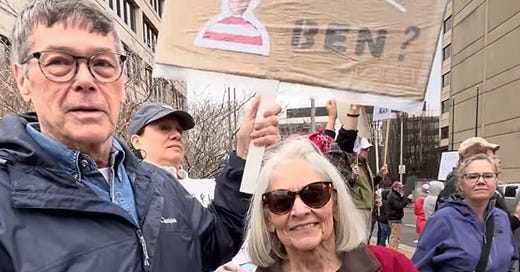


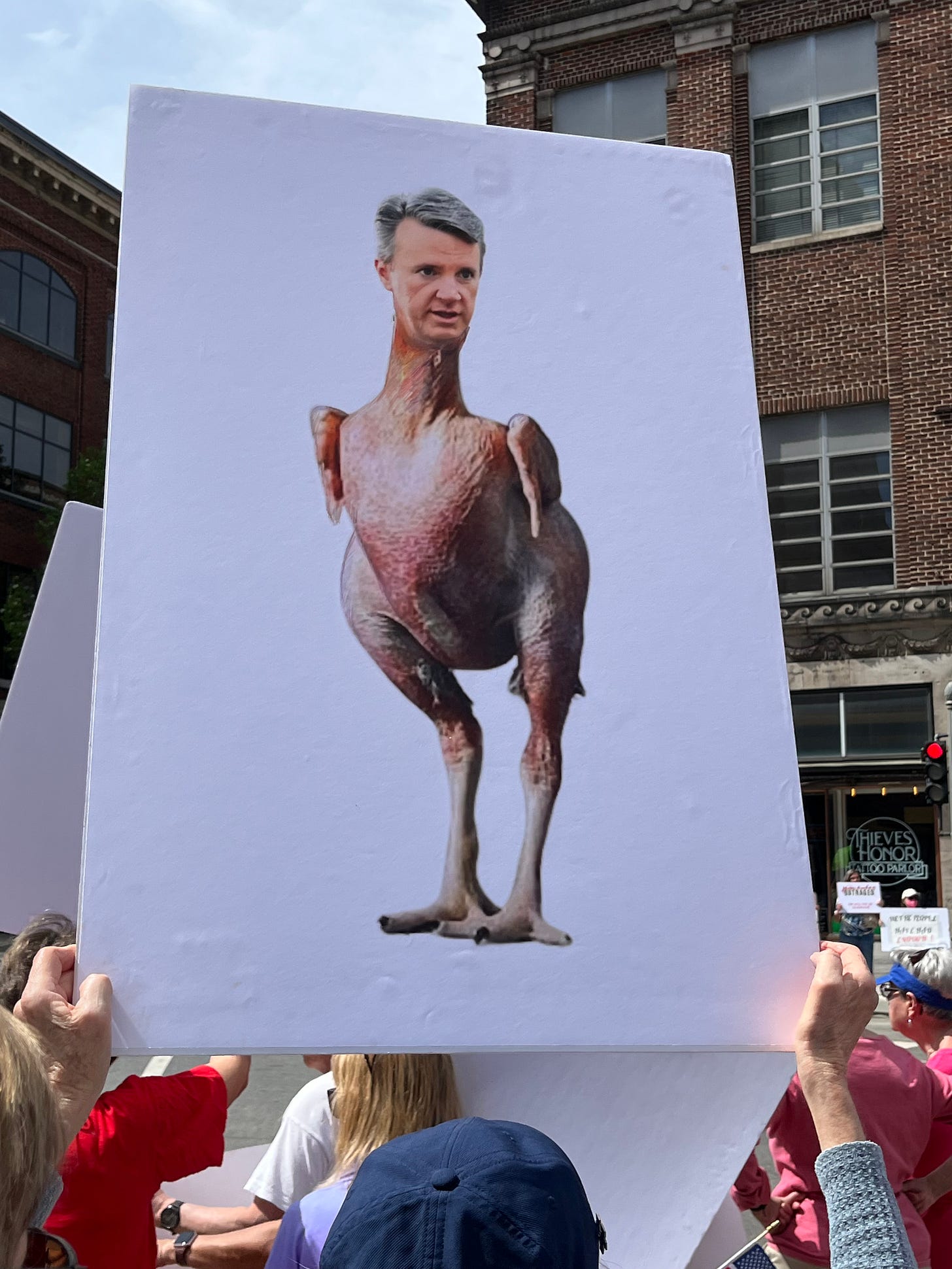
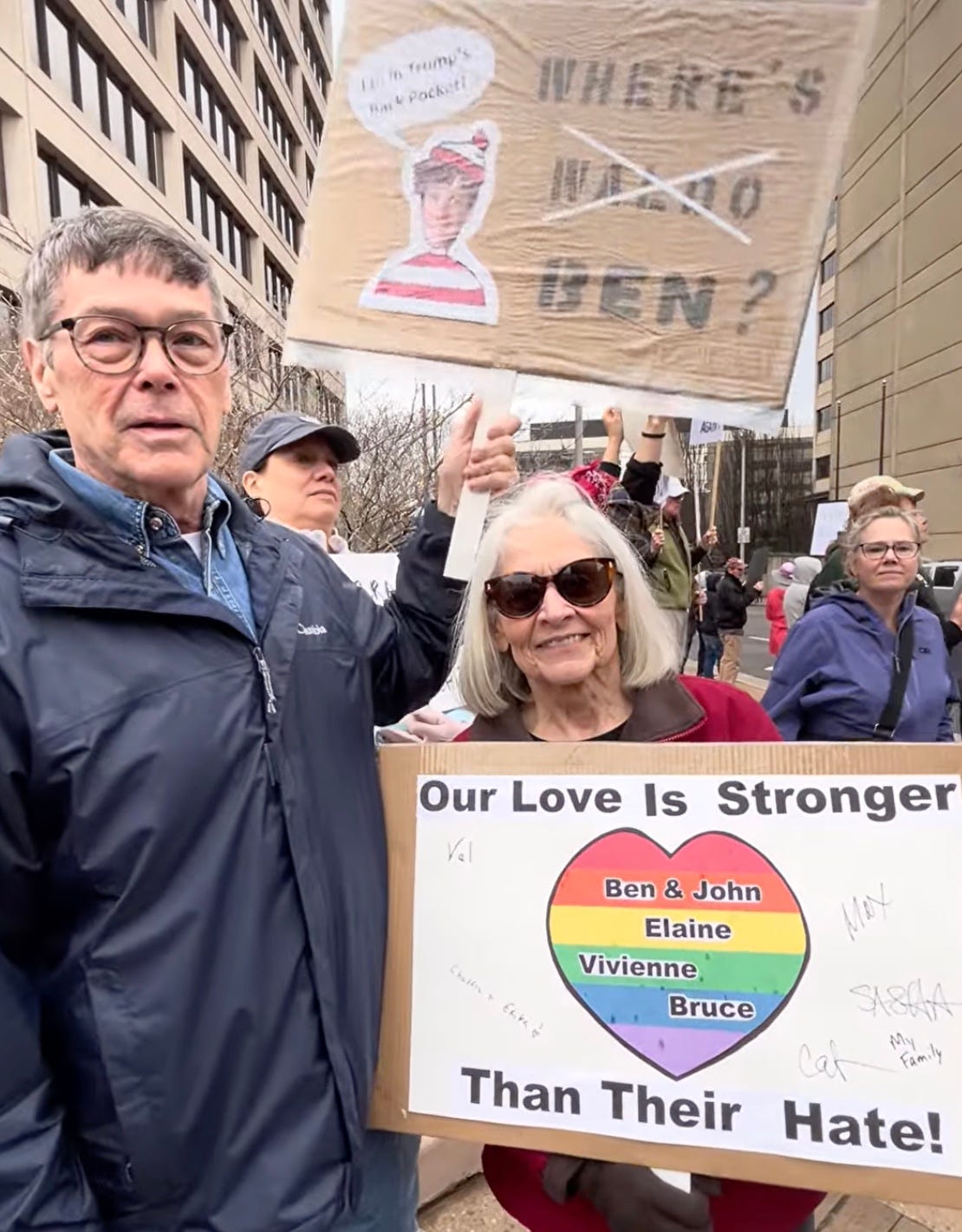

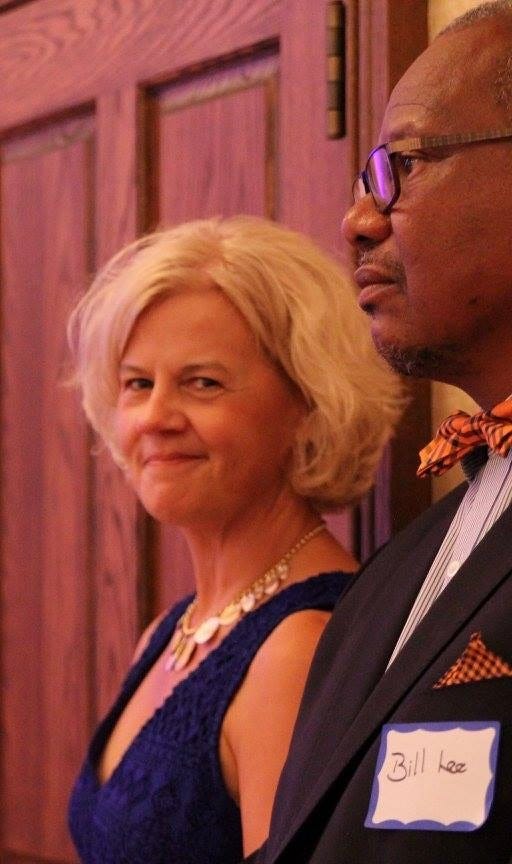
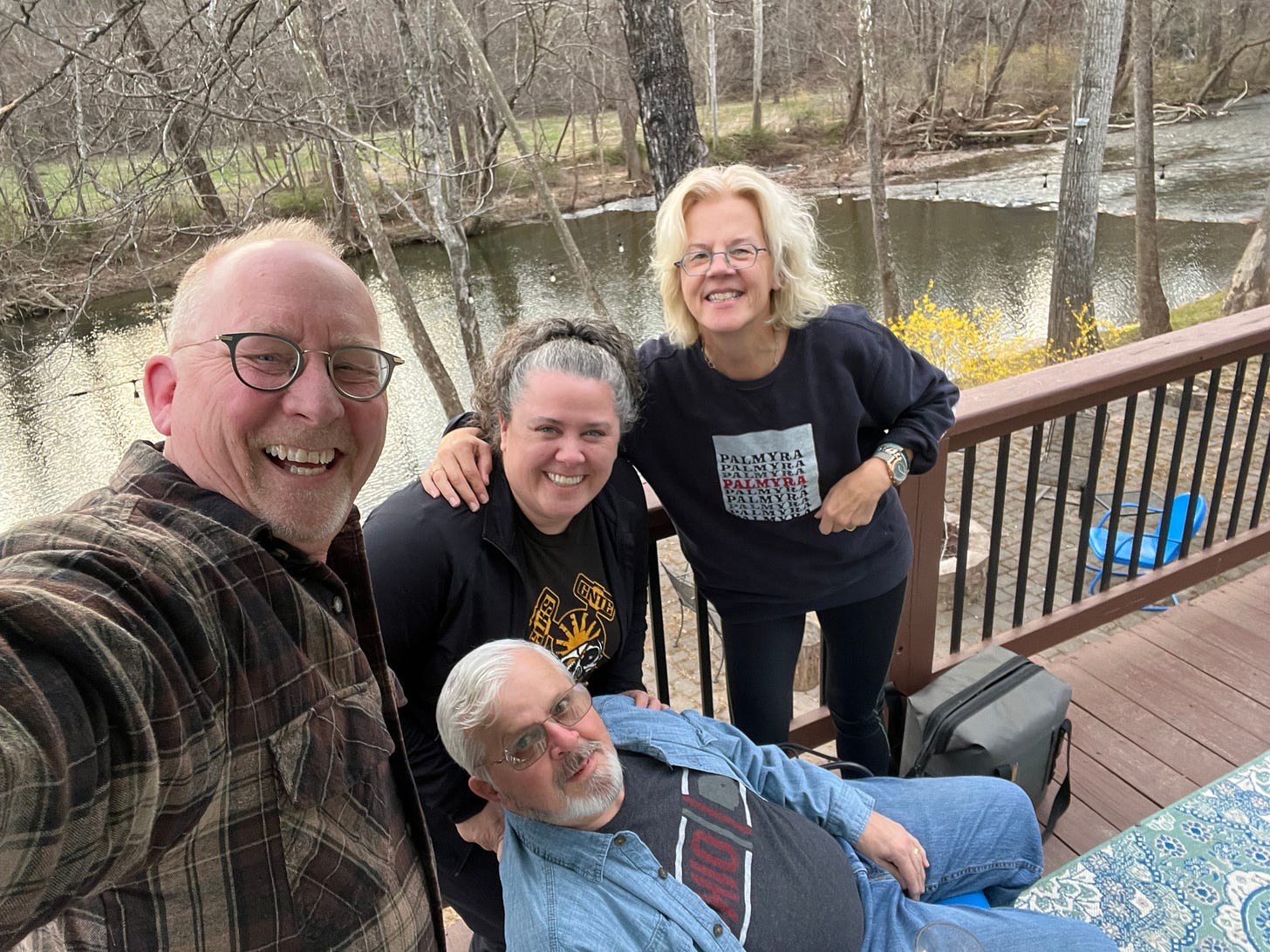
Keep up the good fight, Beth.
I loved reading this, Beth. I often think that much of the hate comes from fear — fear of difference, fear of the unknown. Sometimes it’s only through personal experience that those walls come down. I’ve seen older relatives of mine soften and shift, learning to love people they might once have judged, simply because they got to know them. Real connection opens minds and hearts. Thank you for sharing your family’s story — it matters.